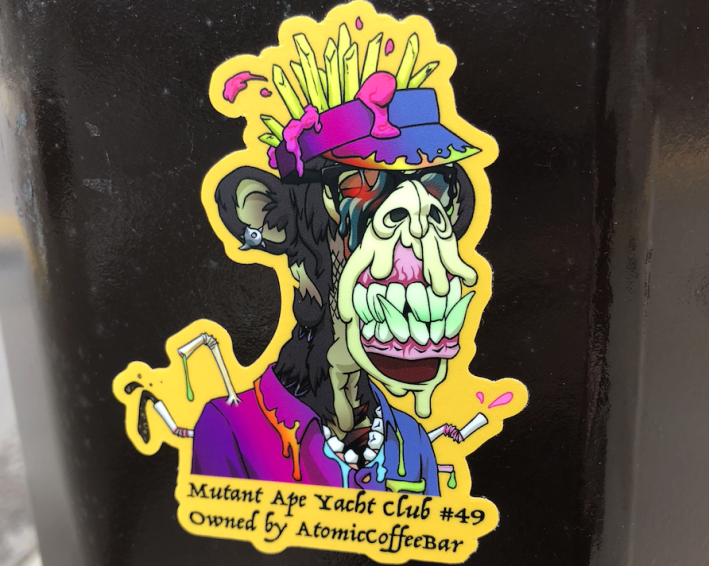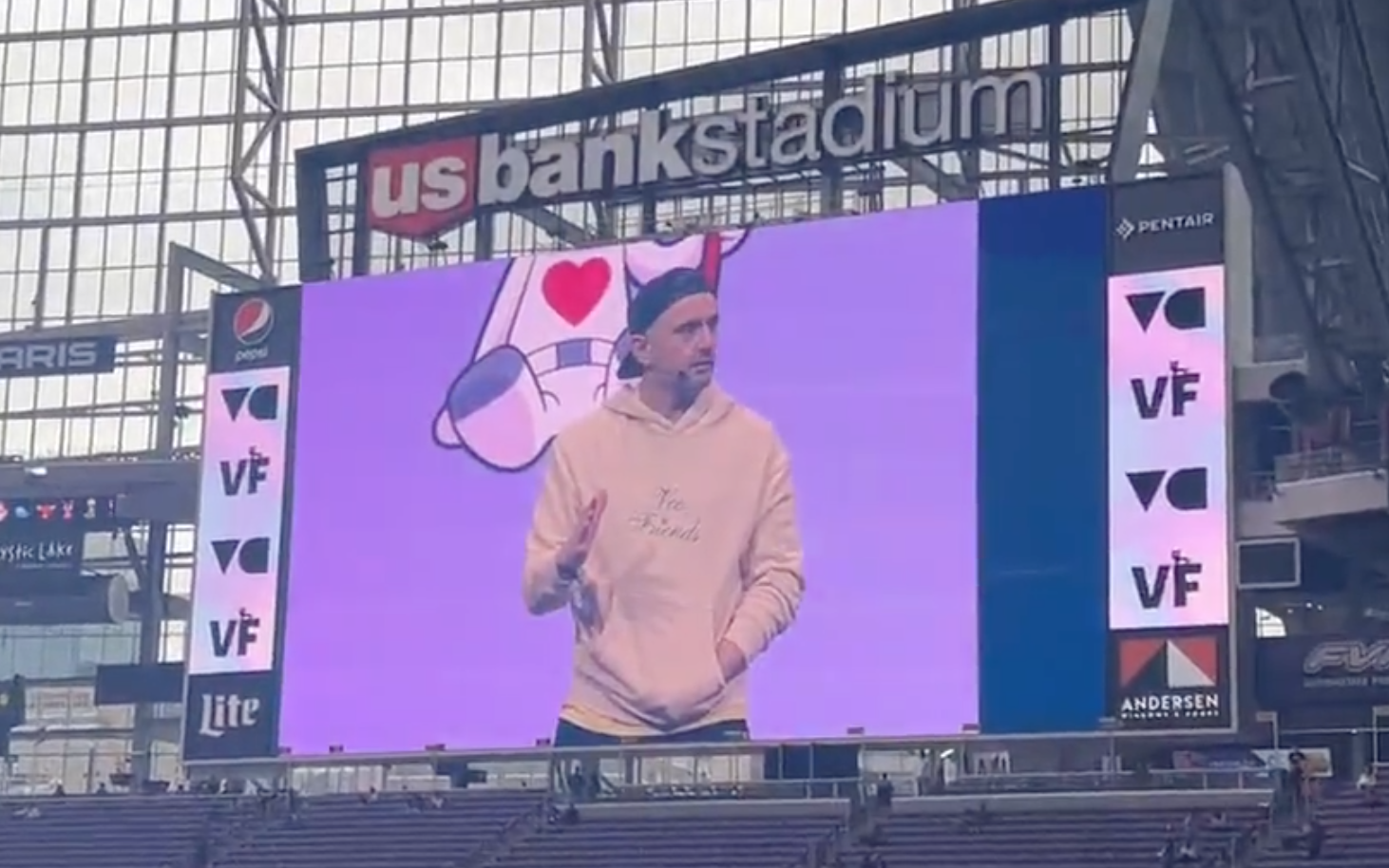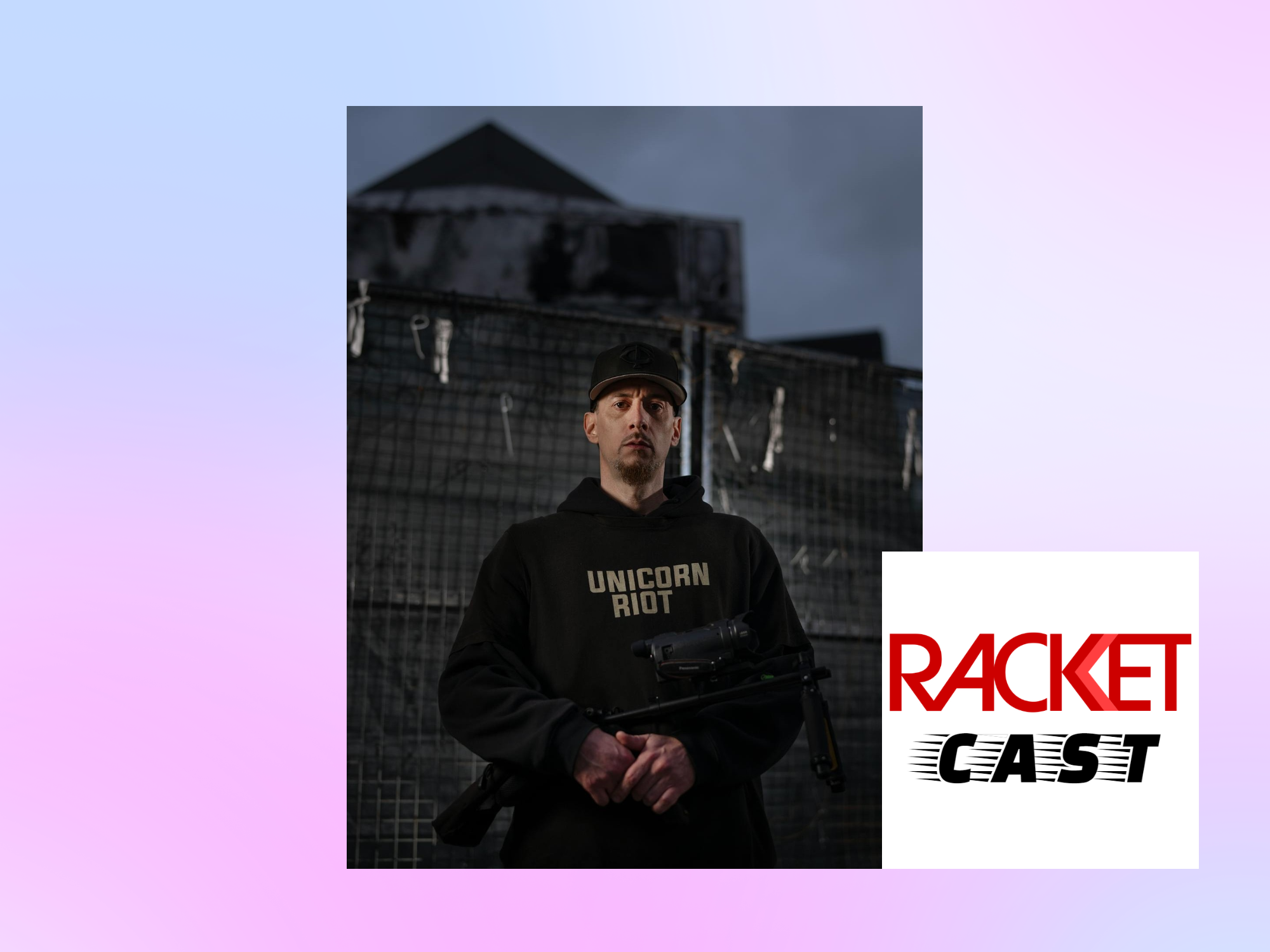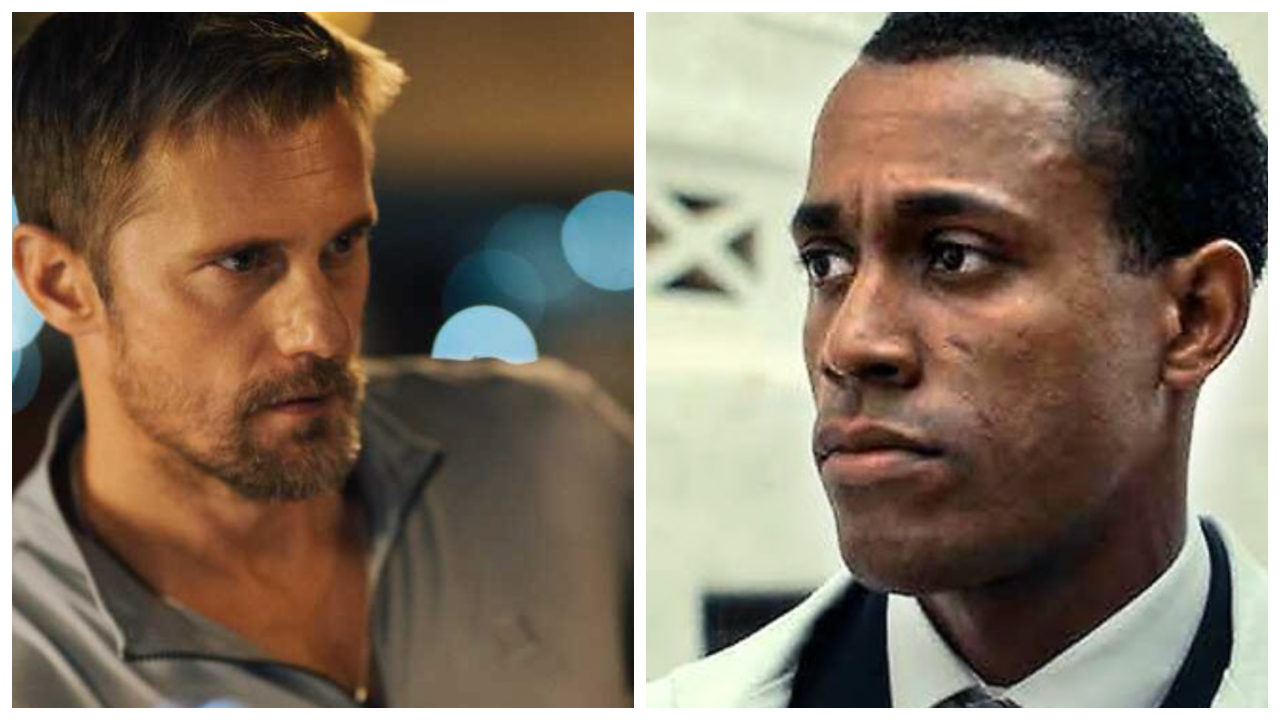Gary Vee, aka Gary Vaynerchuk, is an entrepreneur. He’s also a best-selling author, a YouTuber, a friend of celebrities, an early adopter, and a multi-millionaire. Less flattering descriptors have included cult leader, snake-oil salesman, guru, and influencer with a massive following.
But in the crypto world, Vee is a God. Or at the very least he is a prophet, proselytizing the transformative power of blockchain technology and NFTs. He has amassed 3.1 million Twitter followers, and they all truly fucking love him.
It’s Thursday and the media has convened at Fhima’s in downtown Minneapolis for a hype session with Vee and his friend Maha Abouelenein, who goes by the singular Maha. They believe NFTs are the dawn of Web3, a new era of the internet, of commerce, and of communication. They want you to get in on this unique opportunity before things really blow up.
“A lot of people did not believe the internet would have a strategy in 25 years. There were articles saying that the internet is a fad,” Vee tells the press. “There are articles being written now that NFTs are a fad… I’m passionate because I want you all to know it for yourself.”
That passion manifested as VeeCon, the four-day festival that arrived in Minneapolis last weekend to educate, shill, evangelize, and convert people into true believers of NFTs. Celebrity guests included Spike Lee, Pharrell Williams, Kevin Smith, Mila Kunis, Eva Longoria, Seth Green, Deepak Chopra, Steve Aoki, Logan Paul, Liam Payne, and Snoop Dogg.
Over 6,000 token holders from around the world came to the 73,000-capacity U.S. Bank Stadium to hang, traveling from places as far away as Australia, Norway, Romania, Germany, and India. (When asked “why Minneapolis?” Vee mentions that his family grew up with and are friends with the Wilfs, the owners of the Vikings who are no strangers to frauds, swindles, and scams.)
To buy tickets to this event, attendees had to purchase a VeeFriends token, which gets you into three year’s worth of VeeCons. According to Mintalytics, the average token price was 0.76 ETH (Etherium), or $1,490.67 in U.S. dollars.
To paraphrase Liz Lemon on 30 Rock, Vee knows how to do that thing that rich people do where they take money and turn it into more money. Fresh out of college, he turned his father’s wine company from a $3 million dollar a year business into a $60 million dollar one. From there, the projects kept stacking up, from co-founding online reservation app Resy, to Empathy Wines, one of the first online wine stores, to VaynerX, his media and technology conglomerate.

These days, he is working hard to get the masses onboard with Web3, an umbrella term that covers the clusterfuck of crypto, blockchain technology, and NFTs. Tradeable, collectible art-related NFTs like the Bored Ape Yacht Club or Meta Heroes are what outsiders are probably most familiar with, but NFT fans are quick to point out that digital art is only a small part of its potential. For believers, NFTs are going to be everything.
“NFTs are really fun for collectability and art. As a collector, it absolutely scratches that itch,” Vee says. “But it is a tiny part of the consumer blockchain. We will all interact with NFTs because they will be our airline tickets, they’ll be our receipts, they’ll be our tickets to U.S. Bank Stadium, and our membership cards.”
For those unfamiliar, non-fungible tokens (NFTs) are a form of tech security that uses a ledger (blockchain) to track ownership of that unique digital asset, be it a slurping ape, a video of a basketball player making a slam dunk, a ticket to a show, or, literally, anything. Each time an asset is sold, a new block is added, creating a family tree-type data system that cannot be altered without altering every single ledger in the blockchain.
“The majority of homes, 26 years from today, will be bought peer-to-peer through the blockchain on smart contracts,” Vee predicts. “Nobody in the middle taking a percentage action. And that’s just where we’re going. These decentralized servers are the biggest invention in the human race since centralized servers.”
As the press hang wraps up, Vee waxes philosophical about color theory and the American psyche.
“I think it’s very obvious to people America has gotten very red and blue. I think purple is where the magic is,” he says, echoing spoiler gubernatorial candidate/Vee fanboy Cory Hepola. “We’ve been told that we have to be binary on one side or the other… I’m excited about the challenge of developing [VeeFriends] characters as champions to more purple conversations.”
“Everything in U.S. Bank Stadium is purple,” Maha points out.
“Yeah. That purple thing matters to me,” Vee responds. “I think we really need it.”

Dick Punching, Ape Abductions, and Celebrity Shills
At U.S. Bank Stadium, VeeCon is more than just purple. It’s neon, it’s primary colors, and it’s pastel. It smells like fresh weed and expensive cologne. There’s a huge Ferris wheel with flashing lights that never hosts more than four riders at a time. There are food trucks, there are giant screens, and there’s a DJ spinning tunes between talks.
The line to take a selfie with Gary Vee is longer than the line for coffee, which, at a convention, is saying a lot.
Parts of the stadium floor have been covered in fake grass, and people sit on it like they are picnicking. A giant checkerboard appears to host more photo ops than players. Nearby are two giant Jenga games; sounds of the towers collapsing frequently echo throughout the venue. There are rows of cornhole boxes set up near the stage, too.
The talks are short and sweet and tend to follow a formula. Pro athlete, digital artist, crypto bro, spiritual leader, famous movie maker—they all have the same things to say. They plug their latest projects, they give a shout out to Gary Vee. They talk about the importance of getting in on NFTs early, and tell you how you can bring your friends onboard.
“If you’re going to change the world, show me your hands,” asks a moderator of the audience before bringing the next celeb onstage. “That’s everybody here!”
Celebrity talks range from mildly confusing to folks who are all-in. Spike Lee admitted backstage that he doesn’t even know how to use the TV remote (though he was comfortable starring in an ad that suggested crypto could end racism in the finance sector).
A deer-in-the-headlights Kevin Smith starts talking about using NFTs to fund his latest movie and barely comes up for air before leaving the stage. Eva Longoria and beauty guru Huda Kattan go with a “just us girls” vibe, sharing that a lot of their friendship revolves around talking NFTs.

Seth Green shows up to give a pep talk with his buddy Vee. “The notion that you are destined to fail and not good enough is a false narrative exclusive to your head,” he shouts to the crowd. Vee loves the affirmation so much he makes him repeat it. Green also makes some self-deprecating jokes about losing his Bored Ape to a phishing scam. (Yesterday BuzzFeed broke the news that a project Green had been developing using his Ape had been canceled, as he had lost the rights to the image when it was stolen.)
“We dropped 10,000 tokens, and that community has DIC punched 400,000 times in seven weeks!” says actress/producer Lisa Sterbakov. She and Mila Kunis are here to talk about two NFT-funded animated series they’re working on: Stoner Cats (starring the voice of Jane Fonda) and The Gimmicks. Investors in the latter show can “DIC punch” fellow investors in their community space, sort of like a Facebook “poke.”
The speakers all have success stories to share, because of course they do. (Ben McKenzie, former O.C. heartthrob turned anti-crypto crusader, recently suggested on the Chapo Trap House podcast that many celebrities are simply gifted their NFTs for promotional purposes, so they have no actual skin in the game.) They have connections, they have the money to casually invest, and they have the privilege to back out first if they need to. Whether they realize it or not, celebrities are at the top of the pyramid.
Speaking of backing out, it’s been a rough few weeks in NFT and crypto land. Vee and his converts see NFT technology as the future, but in the present things look grim. Stablecoin TerraUSD recently dropped from $8 to under $.30. Ethereum has traded down by as much as 60% from its 2021 peak, and Bitcoin has hit its lowest level since December 2020.
NFTs have not fared much better. In 2021, when Twitter founder Jack Dorsey NFT’d his first tweet, it sold for a mind-boggling $2.9 million. Last month, when the current owner put the NFT up for sale again, he asked for $48 million. The highest bid topped out at $280.
“We are fully in gold rush mode in NFT land right now,” Vee admits. “I’ve been saying for the last year that I think 98% of the projects that have high value right now will go to zero or something quite low because supply and demand is going to curve out.”
That’s not a good number! Are you looking to invest in NFT land? Keep in mind that you will likely fall into that 98%. Crypto’s recent collapse is not an elephant in the room at VeeCon, however, as pretty much every speaker brings it up and does their part to calm the masses.
“The types of companies that get started in recessions and get the funding to withstand them are really the ones that go on to get huge,” points out one early adopter during a Web2 vs. Web3 talk. “I mean AirBNB, Uber—these types of companies were built during the ‘08/‘09 crash.”
That’s true. But that’s also only two companies. And out of how many? If you can get a mix of celebrities and a few major corporations to invest in your product, like AirBNB did, you might walk away a billionaire. Or if you’re already multi-millionaires, like the creators of Uber, then you don’t have to worry about the current economic climate. This is a pitch that only works for the already-haves, the trustafarians, and the ridiculously rich thrill seekers fine with taking a risk.
But now, as with all multi-level marketing schemes, the capital-rich folks at the top must pass that risk down the chain. And that's where you come in.

Becoming a True Believer
This convention isn’t just an epic networking session. It’s also a mega-church. A neon house of worship. When audiences clap and cheer during talks, it’s like they’re saying hallelujah. Some actually do. Like most religions, though, there is an overpromise of what God/NFTs can do for you.
“We are using NFTs to bring healing to the world. NFTs can be used for good, for healing, for transformation,” explains New Age guru Deepak Chopra. “To be metahuman is to wake up to your spirit, to your soul.”
Chopra believes crypto can be a catalyst for fighting depression. His crypto-token project, Never Alone Initiative, will use a combination of depression screening bots, online yoga, and supportive chatrooms. These are things that already exist, but for whatever reason (he honestly never makes one clear) Chopra believes crypto is the key ingredient that needs to be added to the mix.
“We’re already working with cryptocurrency so we can democratize the entire world,” he announces.
NFTs aren’t just the answer to the mental health crisis. According to some folks at VeeCon, they are also a tool for equality.
“When it comes to building generational wealth, especially Black and Brown people, we don’t have parents or grandparents who come from wealth, right?” asks former WNBA superstar Lisa Leslie. “We don’t have those luxuries. Some of us are the first generation to make millions of dollars. So how do we continue to build that and invest in our own family and our own communities?”
She sees NFT land as colorblind.
“It’s unbiased,” she continues. “It’s not about our race, our gender, our creed. We get to move away from all those things we deal with every day in this world.”
There's no denying that the current financial landscape systematically disenfranchises people of color. But is an unregulated, volatile, decentralized Web3 version better suited to address inequality? That's the consensus at VeeCon.
At VeeCon there’s a lot of talk about how NFTs and crypto will change the world for the better. What never comes up is the environmental impact of this technology, which eats up energy and pollutes the Earth with CO2 emissions on a level that has never been seen before. “Bitcoin, the world’s largest cryptocurrency, currently consumes an estimated 150 terawatt-hours of electricity annually — more than the entire country of Argentina, population 45 million,” writes Jeremy Hinsdale in a May 2022 article for Columbia Climate School. “Producing that energy emits some 65 megatons of carbon dioxide into the atmosphere annually — comparable to the emissions of Greece — making crypto a significant contributor to global air pollution and climate change.”
Many artists, including VeeCon speaker Beeple, a digital artist who sold a single NFT for $69 million, offset their work by investing in green technology. That’s nice and is probably good PR, but if you shit in the street and then plant a tree, does it really offset anything?
Also, let's take a moment to appreciate Beeple's VeeCon inspired art:
GIFT GOAT pic.twitter.com/mQ4z0RWtfI
— beeple (@beeple) May 22, 2022
The Wild Wild West for New vs. Old Money
“I just want you to know how powerful you are,” 13-time Grammy winner Pharrell Williams tells the crowd during his Saturday morning talk. “Blockchain and Web3 are unlocking something that is scaring the system. They are working really hard to put laws to try to legislate around your concept. Your idea. You all are the most powerful human being in the system. You just don’t know it yet.”
Until recently, crypto and NFTs existed in a digital Wild West. When you invest in the stock market or a business project, there are certain protections in place. The dollar bill in your pocket is backed by the U.S. Treasury. There are regulations, laws, and requirements to report income to your country’s government. Until recently, crypto investors didn’t even need to disclose their earnings with the IRS.
That has led to a lot of scams, a lot of losses, and some stunning crime busts. Rap artist, economist, communist, and self-proclaimed “Crocodile of Wall Street” Razzlekhan (aka Heather Morgan) was arrested by the FBI this past February in the biggest crypto scheme to date. She and her husband, Ilya Lichtenstein, are accused of laundering $4.5 billion dollars.
Meanwhile, crypto bros are investing in campaigns and politicians to ensure that when the laws are inked, they go in their favor. According to the FEC, crypto backers have donated over $30 million since 2020. It just hasn’t really paid off… yet.
And there have been scandals. One involved U.S. Rep. Ritchie Torres, who wrote a pro-cryptocurrency opinion piece in the New York Daily News without disclosing that major crypto investors were aggressively fundraising for him. Crypto also has to play nice with the IRS; Biden’s $1 trillion infrastructure bill requires investors to report crypto income via a 1099 form.
“You are the many, and they are the few,” continues Pharrell, who is actually one of the few, quoting Game of Thrones. “And that is enough to push things in the direction of human rights.”
This isn’t really a fight for the many, however. (Neither was GoT, which was ultimately a story of powerful families fighting to rule the world.) This is merely a reshuffling of power among the rich, the connected, and the powerful. Sure, new players might emerge, but at the end of the day if you don’t have thousands of dollars to pay for a VeeCon ticket or millions of dollars from investors, you don’t have a seat at the table.
As for the future, you probably won’t be passing down an heirloom Bored Ape over generations, but Wells Fargo might eventually require you to use blockchain technology to transfer property deeds, or you might have to buy an NFT in order to watch a TV show online. So why are they so fixated on indoctrinating you through conventions, celebrity endorsements, and endless talk about revolutionizing the world? Because, as with all Ponzi schemes, some schmuck has to be left holding the bag when everything implodes.
This is not a peoples’ revolution. This is just a new way for the rich to get richer.






